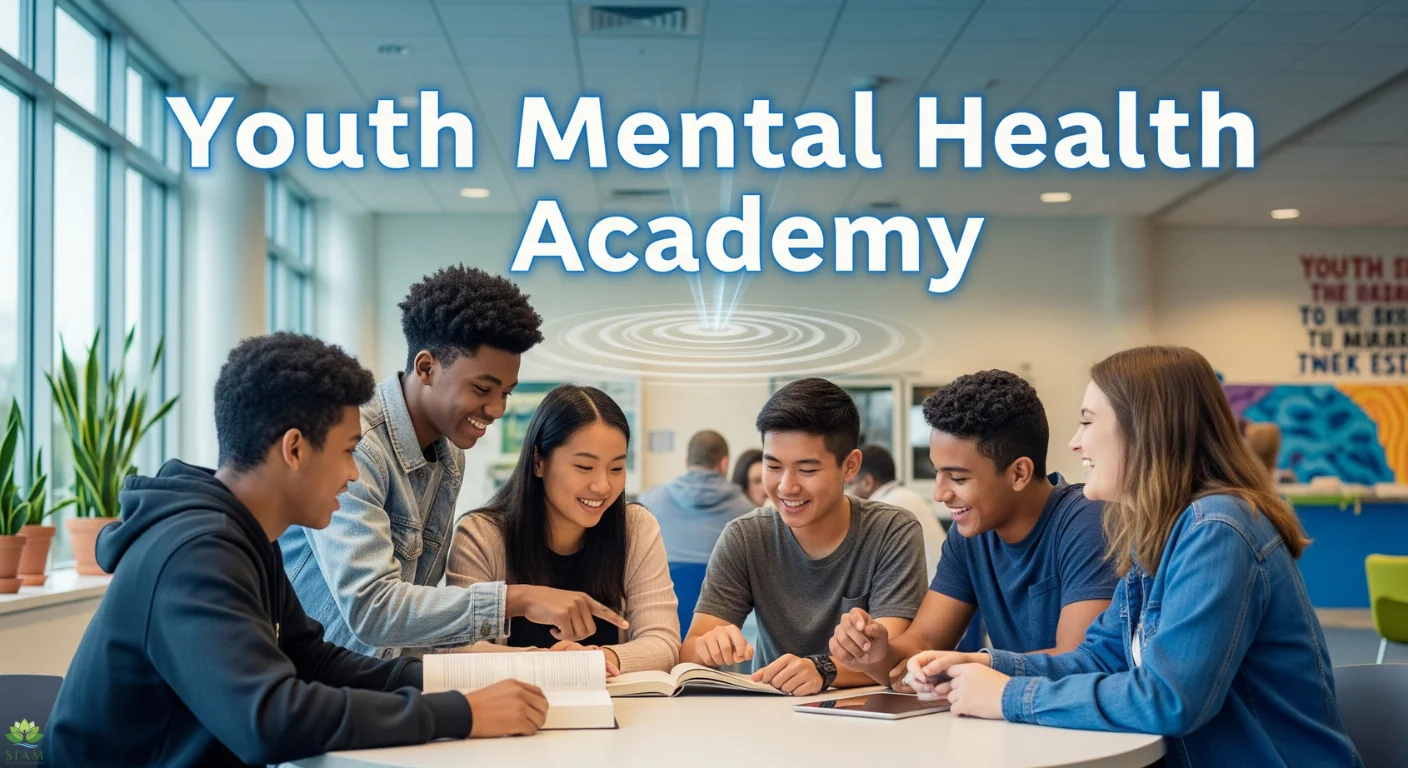The Youth Mental Health Academy is an essential initiative in addressing the growing mental health concerns faced by young individuals in today’s world. Mental health has always been an important aspect of well-being, but its significance in youth culture is often overlooked. This academy provides a platform to educate, support, and empower the younger generation with the tools they need to understand and manage mental health challenges.
In this article, we will explore the importance of youth mental health, the role of mental health programs in supporting young people, and how they help create a more positive and sustainable future for mental well-being.
What Is the Youth Mental Health Academy?
A Youth Mental Health Academy is an institution dedicated to providing resources, education, and support for young individuals dealing with mental health issues. It focuses on raising awareness about mental health challenges, teaching coping mechanisms, and offering interventions to improve emotional well-being. The academy’s main goal is to reduce the stigma around mental health, especially in adolescents, and provide accessible services to help young people navigate their emotional and psychological struggles.
The Growing Need for Youth Mental Health Support
As society progresses, youth are exposed to new challenges that can affect their mental health. From academic pressures to social media influences, the modern world presents unique stressors for young individuals. The statistics are alarming: approximately 1 in 5 children and adolescents experience a mental health condition each year. Many of these young people suffer silently due to a lack of support, understanding, or resources. Mental health programs aim to bridge this gap by offering a structured environment where young people can seek help and gain skills to manage their mental health proactively.
Key Features of a Youth Mental Health Academy
A well-established Youth Mental Health Academy offers a variety of services and features designed to support the mental health of young people. Some of the key features include:
1. Mental Health Education and Awareness
The Youth Mental Health Academy provides essential mental health education, teaching young individuals about different mental health conditions, such as anxiety, depression, ADHD, and eating disorders. By raising awareness, the academy ensures that youth can identify mental health symptoms early on and seek appropriate support.
2. Counseling and Therapy Services
Most academies offer direct counseling and therapy services, either in-person or virtually. These services are aimed at addressing individual mental health concerns, helping young individuals process their emotions, and providing strategies for coping with stress, trauma, or difficult life circumstances.
3. Peer Support Groups
Peer support groups play a crucial role in youth mental health. The Youth Mental Health Academy fosters an environment where young individuals can connect with others who are going through similar challenges. These groups create a sense of belonging, reduce feelings of isolation, and offer mutual support.
4. Workshops and Skill-building Sessions
The academy organizes workshops and skill-building sessions on topics like stress management, mindfulness, emotional regulation, and self-esteem. These workshops empower young people to take control of their mental well-being and build resilience against future challenges.
5. Parental Involvement and Education
The Youth Mental Health Academy also educates parents on how to support their children’s mental health. Parental involvement is crucial in creating a supportive environment for the young individual. The academy offers resources for parents to learn how to identify warning signs and foster open communication about mental health with their children.
Benefits of Enrolling in a Youth Mental Health Academy
1. Early Intervention for Better Outcomes
One of the most significant advantages of a Youth Mental Health Academy is early intervention. By recognizing and addressing mental health issues at an early age, youth are more likely to have positive outcomes. Early support reduces the risk of more severe mental health conditions later in life.
2. Destigmatizing Mental Health
A core principle of the Youth Mental Health Academy is to reduce the stigma around mental health. By fostering open discussions and providing education, the academy encourages young individuals to seek help without feeling ashamed or embarrassed. This leads to a healthier society where mental health is treated as just as important as physical health.
3. Increased Academic and Social Performance
When students’ mental health is supported, they are more likely to perform better academically and socially. Mental health challenges, if left unchecked, can lead to decreased academic performance, absenteeism, and social withdrawal. The academy helps students maintain a balanced and healthy life, which positively impacts their academic success and social interactions.
4. Improved Emotional Regulation
These academies empower young individuals to strengthen their emotional self-management. This can be particularly beneficial during adolescence, a time marked by emotional volatility. Learning how to manage emotions effectively allows young people to cope with life’s ups and downs more confidently.
5. Stronger Sense of Community
Through peer support groups and collaborative learning environments, the academy builds a sense of community. Young people learn that they are not alone in their struggles, and this shared understanding helps build empathy, support, and lasting friendships.
Challenges Faced by the Youth Mental Health Academy
While the Youth Mental Health Academy offers numerous benefits, it also faces certain challenges in reaching and supporting young individuals. These challenges include:
1. Access to Resources
Not every community has easy access to mental health programs. In rural areas or underserved communities, young people may struggle to find nearby resources. Expanding access to mental health education and services is crucial for the success of these programs in reaching more youth.
2. Cultural Barriers
Cultural attitudes toward mental health can influence the effectiveness of the academy. In some communities, there may be cultural stigmas surrounding mental health that prevent young people and their families from seeking help. Overcoming these barriers requires targeted outreach and culturally sensitive programs.
3. Funding and Sustainability
Sustaining a mental health program requires adequate funding. Many such programs rely on grants, donations, or government support. Securing stable financial backing and institutional support is crucial to maintaining consistent and impactful mental health services.
Table: Key Services Provided by the Youth Mental Health Academy
| Service | Description |
|---|---|
| Mental Health Education | Teaching about mental health conditions and coping strategies. |
| Counseling and Therapy | Providing individual therapy for mental health concerns. |
| Peer Support Groups | Creating spaces for shared experiences and mutual support. |
| Workshops and Skill-Building | Offering workshops on stress management, mindfulness, etc. |
| Parental Involvement | Educating parents on how to support their children’s mental health. |
FAQs About Mental Health Programs
1. What age group is the Youth Mental Health Academy for?
The Youth Mental Health Academy is typically aimed at young individuals between the ages of 12 and 18. However, some programs may also offer services to young adults up to age 24.
2. How can I enroll in the Youth Mental Health Academy?
Enrollment procedures vary by academy. It is typically as simple as filling out an application form on the academy’s website or contacting the organization directly for information.
3. Is the Youth Mental Health Academy only for those with mental health issues?
No, the academy is open to all young people. Its goal is to educate, support, and empower youth, whether they are currently facing mental health challenges or simply want to learn more about mental well-being.
4. Are the services provided by the Youth Mental Health Academy free?
Some Youth Mental Health Academies offer free services, while others may charge a fee. It’s essential to inquire about pricing and available financial assistance when considering enrollment.
5. Can parents be involved in the academy?
Yes, the academy often includes programs for parents to educate them about mental health and how they can support their children’s well-being. Parent workshops and resources are a key part of the academy’s approach.
6. How can mental health programs help in preventing burnout?
Mental health programs can teach valuable coping strategies, promote stress management techniques, and encourage self-care practices that reduce the risk of burnout.
7. What are the signs that someone needs professional mental health support?
Signs include persistent sadness, withdrawal from social activities, extreme mood swings, difficulty concentrating, or a decline in performance at school or work.
8. How can parents support their child’s mental health at home?
Parents can create an open environment for discussions, set boundaries, model healthy coping strategies, and encourage self-care routines that prioritize mental well-being.
9. Are virtual therapy sessions effective for young individuals?
Yes, virtual therapy can be just as effective as in-person sessions, providing accessibility, flexibility, and a comfortable space for youth to seek help without the added stress of traveling.
10. What are some ways schools can incorporate mental health awareness into daily routines?
Schools can implement mindfulness activities, hold workshops, train staff to recognize warning signs, and create a supportive environment where students feel safe discussing their feelings.
Conclusion: Empowering the Future of Youth Mental Health
The Youth Mental Health Academy plays a vital role in supporting young people as they navigate the complexities of mental health. By offering education, counseling, peer support, and skill-building resources, it empowers youth to take control of their mental well-being and break down the stigma around mental health. If you or a young person you know is struggling with mental health, consider reaching out to a program that offers invaluable resources that can make a world of difference.

Salman Khayam is a business consultant at Siam IT Solutions, specializing in digital marketing, PPC, SEO, web development, e-commerce, and email marketing. He designs custom strategies that deliver measurable success.


